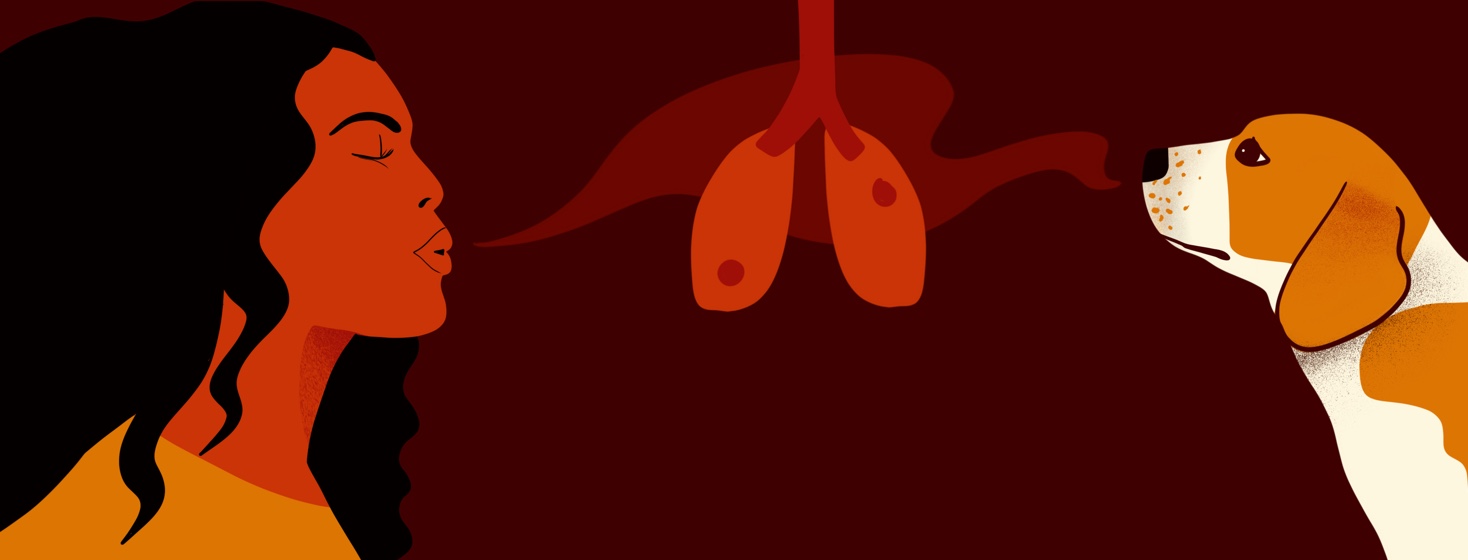Coming Soon! Dogs May Help Diagnose Your Lung Cancer!
I have quite a few friends in the "dog world" who have gotten really involved in scent training. The dogs seem to really enjoy the sport and the owners love seeing their dogs succeed. When I saw an article that focused on dogs that have been trained to detect the scent of lung disease, I was particularly excited to read it – both because I have lung cancer and because I know how well some of my friends’ dogs do on various scent tests.
Who knew? I surely have never considered the fact that my exhaled breath has a different odor than that of someone without lung cancer or chronic obstructive pulmonary disease. Apparently, it does and that fact alone is interesting to me.
Can dogs sniff out cancer?
Data was recently presented at the 19th World Conference on Lung Cancer (WCLC) showing where a dog identified the breaths of people who had a malignant pulmonary nodule with "successful results with a 97 percent sensitivity, a 99 percent specificity, a 97 percent positive predictive value, and a 99 percent negative predictive value."1
Wow!! I don’t know about you, but I read those words with great excitement! Think how much easier and cheaper it would be if all we had to do was breathe into a test tube (or however it is they capture breath) and voila, a diagnosis could be made, by a dog and its trainer, about whether or not we have cancer ... and with a 97 percent reliability rate. That could certainly revolutionize lung cancer diagnosis. No CT scans, no PET scans ... just a dog and his owner in a room with your breath.
Notable questions about the data
But some experts warn us not to get too excited about these prospects just yet. Alain Tremblay, MD, professor of medicine, University of Calgary, in Alberta, Canada, believes that the dog is identifying the breaths of people with malignancies because of inadvertent cues given by its trainer. (I am no scientist, but it seems it would be simple enough to hide from the trainer which tubes had malignant breaths in them so that there would be no cues given. I’m not sure why the trainer needs that information in advance if not to guide the dog.)
Using beagles to identify lung cancer
Well, even if there are some naysayers to the idea of using dogs to detect cancer, there are other researchers who think there just might be something to it. For example, a research team led by Prof. Thomas Quinn from Lake Erie College of Osteopathic Medicine in Erie, PA, is training beagles to detect the smell of cancer in blood samples.
According to the study authors, "The olfactory acuity of a dog is at least 10,000 times more sensitive than that of a human, which is likely due to their more expansive olfactory epithelium and olfactory receptors and their ability to retain air in their nasopharynx during exhalation."2
After training four beagles for only eight weeks, three of the four were asked to identify blood samples of people with non-small cell lung cancer compared to those of healthy individuals. According to the researchers, "The dogs successfully made the distinction between the two types of samples, identifying the presence of cancer with 97.5 percent specificity, and 96.7 percent sensitivity."2
Staying open-minded for future research
Even though I am a huge dog lover who is quick to entertain you with stories about how smart my dogs are, I would still be a bit skeptical about leaving my diagnosis to the noses of dogs. At the same time, I am sure glad to see this sort of research being done and will be interested in seeing where it goes in the future.

Join the conversation